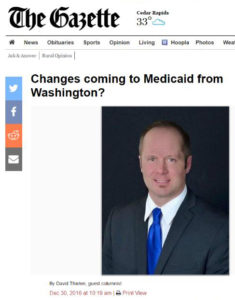What Do Moms Need?
Last week, The Arc was excited to join nearly 50 national organizations that co-sponsored the #MomsDontNeed / #LasMamásNoNecesitan Tweet storm. On Twitter, we called attention to recent actions and policies that threaten mothers and families, and highlighted the kind of supports they and all people truly need to protect and advance their economic security, health, and more.
Moms with disabilities, and moms of children with disabilities, do so much. And across the nation, moms are working harder than ever. With Congress considering legislation to devastate our health care system, and with new reports of major cuts in the works to Medicaid, Social Security disability benefits, and other effective federal programs, so much is at stake – for moms, and for all of us. As The Arc celebrates Mother’s Day, here are three things that we know are vital to supporting mothers and their many contributions.
1. Access to Health Care and Long-Term Supports and Services. Health insurance under the Affordable Care Act can make all the difference in the world. Just listen to Lindsay, mother of toddler Calvin, if you’re not sure why. In addition, for many people with intellectual and developmental disabilities, Medicaid provides a range of essential medical and long-term supports and services that make community living a reality and for many, can be the difference between life and death. Unfortunately, the American Health Care Act (AHCA) – passed recently by the House of Representatives and now before the Senate – shows callous and dangerous disregard for the wellbeing of people with disabilities and their families. Among the bill’s many harmful provisions, the AHCA would decimate Medicaid, erase health insurance cost protections for people with pre-existing conditions, and cause people to lose essential health benefits under state waivers. The AHCA is one bill that #MomsDontNeed.
2. Economic Security. For most moms and families of children and adults with intellectual and developmental disabilities, every penny counts. For example, raising a child with disabilities can be tremendously expensive due to major out of pocket medical and related costs, like adaptive equipment and therapies. For many families, earnings from work aren’t enough to maintain a basic standard of living and cover these often-extraordinary disability-related costs. It’s only possible because of income from Social Security’s disability programs, including Supplemental Security Income (SSI). Unfortunately, recent news reports suggest that President Trump’s 2018 budget will propose major cuts to Social Security disability benefits, as well as Medicaid and a host of other programs – totaling $800 billion in cuts. That’s another devastating idea that #MomsDontNeed.
3. Paid Family and Medical Leave. Moms with disabilities, and moms of children with disabilities, know better than most that time is a precious resource. At The Arc, we hear often from moms and dads struggling to get enough paid time off work: to be with a new baby in the Neonatal Intensive Care Unit; to care for a new baby with disabilities when they first come home; to take their son or daughter to medical appointments, therapies, and after school programs; to attend IEP meetings and other school appointments – and so much more. And while we all love Wonder Woman, let’s face it, moms get sick, too. Moms shouldn’t have to choose between a pay check and a child’s health, or a pay check and their own health. Not moms, not anyone. That’s why The Arc is joining the call for a robust federal paid family and medical leave program. We hope you’ll #JoinOurFight!


 David Thielen, CEO of The Arc of East Central Iowa, had a
David Thielen, CEO of The Arc of East Central Iowa, had a  Heather Denman, Executive Director of The Arc of Harrison and Rockingham, appeared in a
Heather Denman, Executive Director of The Arc of Harrison and Rockingham, appeared in a 





